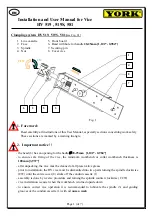
e)
After tighten vice first is must to seat all edges of clamping jaw with the workbench board.
See Fig.7.
f)
Finally, check the operation of the vice’s system. By turning the spindle (3) clockwise (CW)
the vice clamp. By turning the spindle (3) counter clockwise (CCW) the vice disengage.
Vice disassembly is done by reversing the steps described in this User Manual.
Page 7 (of 7)
Fig.7

























